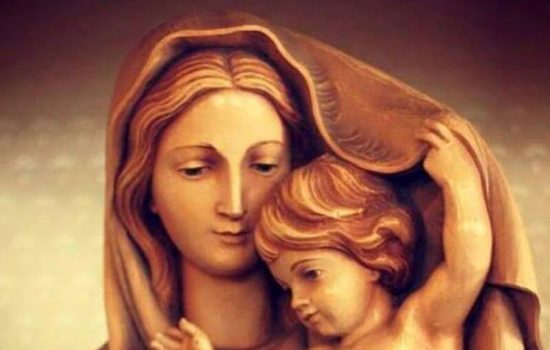January 1st: Mary, Mother of God / AÑO NUEVO, VIDAS NUEVAS
As we continue to celebrate the birth of Jesus, we turn our attention on January 1st to his mother Mary. What does the title Mother of God say about Jesus? It means that the humanity and divinity of Jesus are united in Jesus. There is not a separate human Jesus and a separate divine Jesus, there is one Jesus with a human nature and a divine nature, true God and true man, and because there is one Jesus, we say Mary is Mother of God. There was a misunderstanding about this very issue in the fifth century that led to hundreds of bishops meeting in 431 AD during the Council of Ephesus which clarified that it is indeed correct and proper to give the title Mother of God to Our Lady because there is one Jesus with a human nature and a divine nature. Even before that clarification, the title Mother of God had been used by the faithful when describing Our Lady. Following the clarification by the Council of Ephesus that it is right and proper to title Our Lady as Mother of God, many churches were dedicated to Our Lady, and in 432 AD, the year after the Council of Ephesus, the construction of the Basilica of St. Mary Major in Rome was begun which is first in importance in the world as a Marian shrine for pilgrims.
Mother of God! Some would like to know if there is anything in Sacred Scripture, in the Bible, to support the title Mother of God and the clarification by the bishops in the Council of Ephesus. Yes, just as for so many of our Catholic beliefs, there are statements in Scripture that give us the background. We could begin with an excerpt of Paul’s letter to the Galatians, in which we hear, “God sent his Son, born of a woman.” (Gal 4:4) God the Father sent his Son Jesus into the world and Jesus was born of a woman. This statement from St. Paul supports the title Mother of God, “God sent his Son, born of a woman.” Another helpful statement in Scripture supporting the title Mother of God is in Luke’s Gospel when Mary visits Elizabeth and Elizabeth cries out, “How does it happen that the Mother of my Lord should come to me?” (Luke 1:43) Elizabeth proclaims Mary to be the “Mother of my Lord.” This is indeed very close to Mother of God. She became Mother of God because God had specially prepared her to be the perfect dwelling place for Jesus to grow for the nine months before he was born. We call this special preparation of Our Lady to be the perfect mother of Jesus her Immaculate Conception which we celebrated on December 8th. She is indeed “our tainted nature’s solitary boast” as the poet Wordsworth wrote. We thank Our Lady for becoming the Mother of God. We are very happy to venerate Our Lady especially today as Mother of God because we know of her love for us as she comes again and again to help us in places such as Lourdes and Fatima, and we love her in return.
We read the excerpt from Paul’s letter to the Galatians today because Paul wrote, “God sent his Son, born of a woman.” What about today’s Gospel? (Luke 2:16-21) Why do we have this particular Gospel excerpt today about the shepherds visiting Jesus, Mary and Joseph? Of course, it refers to Our Lady but the reason is because the excerpt concludes by telling us what happened eight days after the visit of the shepherds when Jesus was born, the octave of his birth, which is today. It tells us on that, today, Jesus was circumcised and given the name Jesus (Luke 2:21). Jesus is the name given him by the angel Gabriel. It is a divine name, not a name to be used disrespectfully in a blasphemous way. It is good to recall the sacredness of the name Jesus and the sacredness of the titles given him, including the title Christ.
As we begin this New Year, we venerate Mary the Mother of God, who was specially prepared by God to be the perfect sinless mother for Jesus while he grew in her womb for the nine months before he was born, “our tainted nature’s solitary boast.” It is indeed correct to call her Mother of God because there is one Jesus with a human nature and a divine nature. We ask God to bless our year ahead in the words which God himself asked priests to use in the temple:
The Lord bless you and keep you
The Lord let his face shine upon you, and be gracious to you
The Lord look upon you kindly and give you peace (Num 6:24-26)
Puede ocurrir en cualquier momento. Tal vez, minutos antes de cenar. O cuando se ha hecho silencio, tras la ruidosa y alegre celebración familiar del Año Nuevo. O en el momento de llegar a la cama esa noche. Poco importa cuál sea la ocasión. Pero nos va a llegar. Rápidamente, haremos un balance grueso del año que termina y un propósito rápido para el año que comienza. Todo ello se refleja bien el refrán castellano que dice: “Año Nuevo, Vida Nueva”. Y los cambios suelen abundar. Los tiempos fronterizos son importantes. No es malo recapacitar sobre nuestra vida pasada, pero solo como camino de enseñanza. Y es que los aconteceres del –ya– año pasado, me van a traer una evaluación de nuestra vida y, sin duda, un deseo de mejorar.
EL HOMBRE NUEVO
San Pablo habla mucho del “hombre nuevo”. Hay que revestirse de esa novedad y “enterrar” al hombre viejo. Es de suponer que el cambio dado por los paganos convertidos sería impresionante. También, para los judíos que reconocían la divinidad de Jesús. Unos vivían en un mundo insolidario, inmoral y, en algunos casos, embrutecido. La cultura –la gran cultura grecorromana— era un privilegio de unos pocos. Los judíos estaban inmersos en una religión que solo tenía normas y en una fuerte influencia de las supersticiones venidas de todo lugar. Si bien eran drásticos a la hora de admitir la adoración a cualquier otro dios que no fuera Yahvé, no lo eran tanto a la hora de aceptar “creencias menores”.
En fin, que el hombre y la mujer nuevos por el efecto del Evangelio construían sus vidas nuevas muy diferenciadas de lo anterior. No es muy diferente para las gentes de nuestro tiempo, que abandonando los viejos modos, abracen el seguimiento de Cristo. La sociedad occidental moderna tiene muchos aspectos de “barniz cristiano” que, por supuesto, no es cristianismo. Ya hemos dicho alguna vez que nuestro mundo actual se parece, en algunas cosas, el tiempo de los paganos.
CONSOLIDAR NUESTRA CONVERSIÓN
Un buen argumento obtener o consolidar nuestra conversión es pedírselo a Dios Padre, en nombre de su Hijo Jesucristo. Sabemos que Él no nos va a negar nada que pidamos en nombre de su Hijo. Pero debe estar presente nuestra dedicación a ese trabajo de seguimiento de Jesús. En ese camino no faltará la ayuda de Dios. Siempre que, orando, pidamos ayuda para nuestro camino espiritual, llegará.
Será mediante una muy especial comprensión de un párrafo en un libro, que antes nos parecía oscuro. Una frase de especiales brillos, surgida, tal vez, de una homilía un tanto átona, que escuchamos sin especial disposición. Un sin importancia pero que rezuma el sentimiento fehaciente de que Dios está cerca. Se habla mucho del silencio de Dios. Y nada podemos decir de ello, porque los testimonios que hablan de ello son importantes. Pero ¿no será que esperemos la gran declaración y despreciamos el mensaje mínimo? Hemos de estar atentos a esas indicaciones de Dios, que nos llegaran siempre como un susurro y muy pocas veces como un viento impetuoso.
EL TIEMPO FRONTERIZO
Y es que el camino de conversión está lleno de momentos y de matices. Los tiempos fríos y oscuros existen. Pero es probable que nosotros mismos, con nuestros despistes o autoengaños contribuyamos decididamente a la importancia de esos tiempos. Pero es muy bello hacer nuestro propósito de ser mejores en –como decía— estos tiempos fronterizos del Año Nuevo. Si nuestros propósitos están dichos a Dios con toda confianza van a hacerse realidad. Aunque, probablemente, haya alguna diferencia entre lo que nosotros habíamos esperado y lo que nos llegue. Pero no importa, porque de una forma u otra vamos a gustar de la cercanía del Señor.















